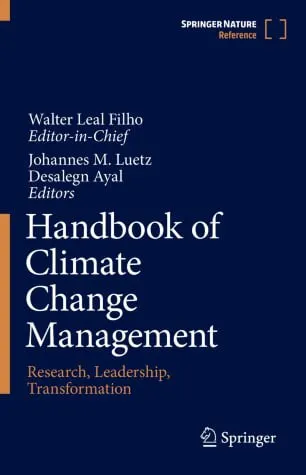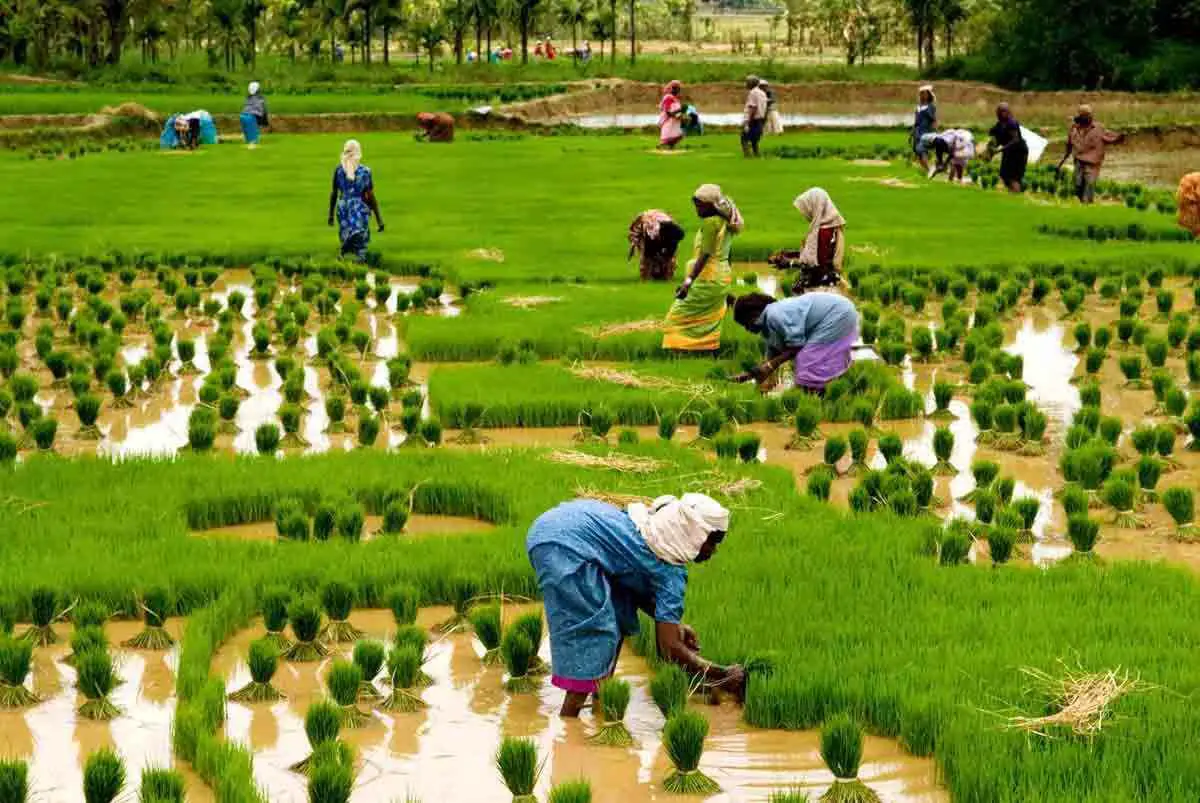Nigeria needs biotechnology to weather climate change impacts on farming, say West African scientists
Nigeria needs biotechnology to weather climate change impacts on farming, say West African scientists


“Evidence of climate change on agriculture in Nigeria has since been established and increased atmospheric warmness, irregular rainfall, emergent pests, [crop] diseases…and their resultant adverse effect on agricultural productivity are glaring,” the authors write in the November 2021 Handbook of Climate Change Management. “This scenario poses a serious threat to food security in Nigeria and calls for the adoption of innovative biotechnologies to create resilient crops with improved adaptation to the environmental stresses occasioned by the increasing climate change.”
 While agricultural production is extremely vulnerable to the impacts of climate change, the higher mean temperatures and longer growing seasons resulting from global warming could favor farming in regions where temperatures are already low, like North America, Europe and Asia, the authors write. But production in already hot regions, like Africa, will possibly suffer greater productivity declines as higher temperatures bring longer periods of excessive heat, which in turn shorten the growing season and eventually reduce crop yields.
While agricultural production is extremely vulnerable to the impacts of climate change, the higher mean temperatures and longer growing seasons resulting from global warming could favor farming in regions where temperatures are already low, like North America, Europe and Asia, the authors write. But production in already hot regions, like Africa, will possibly suffer greater productivity declines as higher temperatures bring longer periods of excessive heat, which in turn shorten the growing season and eventually reduce crop yields.
Additionally, research and a 2010 global weather forecast assert that climate change will reduce global agricultural production by 6 percent by the year 2080 — a figure that could reach 30 percent or more in warm regions like regions like Africa and India, write the authors, who are affiliated with Ebonyi State University in Nigeria and the Boyce Thompson Institute (BTI) at Cornell University. (Disclaimer: The Alliance for Science is housed at BTI.)
African farmers who have little or no access to irrigation facilities will be hardest hit, they write. “Therefore, farmers in these regions very much need innovative practices and technologies that improve agricultural production under the prevailing climate change scenarios. Current biotechnologies have provided limitless opportunities to expand crop improvement through [their] capacity to source genes for desired traits from distantly related species.”
Agricultural biotechnology has helped to reduce the greenhouse gas emissions (GHG) that contribute to climate change and develop crop cultivars that can tolerate heat, cold, drought, submergence and salinity stress, as well as pests and diseases, the authors write.
However, an assessment of the effects of climate change on agriculture, the anthropogenic causes of climate change and the current biotechnologies employed for climate change mitigation and adaptation in Nigeria “exposed the country’s very low capacity to deal with climate change issues using biotechnology approaches,” the authors conclude.
“In Nigeria, only IITA [International Institute of Tropical Agriculture] has the technical capacity for crop genetic engineering approach,” they note.
Nigerian researchers have developed two biotech crops to help farmers weather these challenges: insect-resistant (Bt) cotton and cowpea. Both have been approved for commercial use. Two other genetically modified crops —Africa bio-fortified sorghum and Nitrogen-Use Efficient, Water-Use Efficient and Salt-Tolerant (NEWEST) rice — are at different stages of field and confined field trials.

“Despite the numerous organizations that should be involved in the development, adoption, promotion and regulation of agricultural biotechnology in Nigeria, a recent comprehensive review of the current status of agricultural biotechnology in Nigeria showed that the rate of development, adoption and implementation of agricultural biotechnology in Nigeria is still at a low ebb,” the authors assert. “In particular, research and deployment of transgenic technology is still in its embryonic stage in Africa’s most populous country…The slow rate of development and deployment of biotechnology in agriculture in the nation is unequivocally due to ethical, socioeconomic,and political issues, as well as poor knowledge of the technologies.”
The authors warn that “total reliance on conventional breeding methods in developing climate-friendly and resilient crop varieties, without incorporating the more efficient, modern, advanced, precise and reliable biotechnology techniques, will in the long-run deprive the rapidly expanding population access to adequate food provision and threaten food security and economic development.”
Land use change and forestry (LUCF) and the energy sector accounted for up to 70 percent of Nigeria’s GHG emissions in 2014. Agriculture contributes about 13 percent, largely from livestock production and rice cultivation. In Nigeria, farmers use huge quantities of synthetic (nitrogen) fertilizers annually to boost crop yields, especially rice, which leads to high emission of N2O from this sector, the authors write.
Nigeria’s agricultural sector produces far more GHG emissions than in developed nations due to its use of traditional agricultural practices and overdependence on farming, the authors note.
Climate change has already been triggering drought and flooding scenarios that adversely affected crop production in various parts of Nigeria, the authors write. Reduced rainfall occurred in some northern states in 2010 and reduced millet, sorghum and cowpea production by about 10 percent. Other northern states that do not normally have heavy rainfall have experienced flooding that reduced rice production by as much as 50 percent.
Temperature and rainfall fluctuations are also associated with increases in plant diseases and insect pest pressure that further suppress production and make farming increasingly difficult. “Climate change-induced crop yield losses are forcing existing and potential farmers in Nigeria to abandon farming for nonfarming ventures,” the authors warn.
“As the effects of climate change on agricultural productivity in any region do not depend only on the changing climatic conditions, but even more on the region’s adaptive response capacity, Nigeria is at a high risk of the damaging effects of climate change if effective adaptive and mitigation technologies and strategies remain acutely lacking,” the authors caution.
“However, with the emerging biotechnology landscape in Nigeria, harnessing innovative biotech approaches for effective response to climate change is pivotal, but would require concerted efforts and engagement of all stakeholders including policy makers, scientists, and farmers.”
Joan Conrow has more than 35 years of experience as a journalist and editor. She specializes in environmental issues, biotechnology, and agriculture, and is especially interested in how these highly charged topics are playing out globally. Joan holds a BA in history and journalism and is certified in beekeeping, mediation, and facilitation. Find Joan on Twitter @joanconrow
A version of this article was originally posted at the Cornell Alliance for Science and is reposted here with permission. The Cornell Alliance for Science can be found on Twitter @ScienceAlly

 | Videos | More... |

Video: Nuclear energy will destroy us? Global warming is an existential threat? Chemicals are massacring bees? Donate to the Green Industrial Complex!
 | Bees & Pollinators | More... |

GLP podcast: Science journalism is a mess. Here’s how to fix it

Mosquito massacre: Can we safely tackle malaria with a CRISPR gene drive?

Are we facing an ‘Insect Apocalypse’ caused by ‘intensive, industrial’ farming and agricultural chemicals? The media say yes; Science says ‘no’
 | Infographics | More... |

Infographic: Global regulatory and health research agencies on whether glyphosate causes cancer
 | GMO FAQs | More... |

Why is there controversy over GMO foods but not GMO drugs?

How are GMOs labeled around the world?

How does genetic engineering differ from conventional breeding?
 | GLP Profiles | More... |

Alex Jones: Right-wing conspiracy theorist stokes fear of GMOs, pesticides to sell ‘health supplements’




 Viewpoint — Fact checking MAHA mythmakers: How wellness influencers and RFK, Jr. undermine American science and health
Viewpoint — Fact checking MAHA mythmakers: How wellness influencers and RFK, Jr. undermine American science and health Viewpoint: Video — Big Solar is gobbling up productive agricultural land and hurting farmers yet providing little energy or sustainabilty gains
Viewpoint: Video — Big Solar is gobbling up productive agricultural land and hurting farmers yet providing little energy or sustainabilty gains Trust issues: What happens when therapists use ChatGPT?
Trust issues: What happens when therapists use ChatGPT? Fighting deforestation with CO2: Biotechnology breakthrough creates sustainable palm oil alternative for cosmetics
Fighting deforestation with CO2: Biotechnology breakthrough creates sustainable palm oil alternative for cosmetics California, Washington, Oregon forge immunization alliance to safeguard vaccine access against federal undermining
California, Washington, Oregon forge immunization alliance to safeguard vaccine access against federal undermining 30-year-old tomato line shows genetic resistance to devastating virus
30-year-old tomato line shows genetic resistance to devastating virus The free-range chicken dilemma: Better for birds, but with substantial costs
The free-range chicken dilemma: Better for birds, but with substantial costs ‘You have to treat the brain first’: Rethinking chronic pain with Sanjay Gupta
‘You have to treat the brain first’: Rethinking chronic pain with Sanjay Gupta
